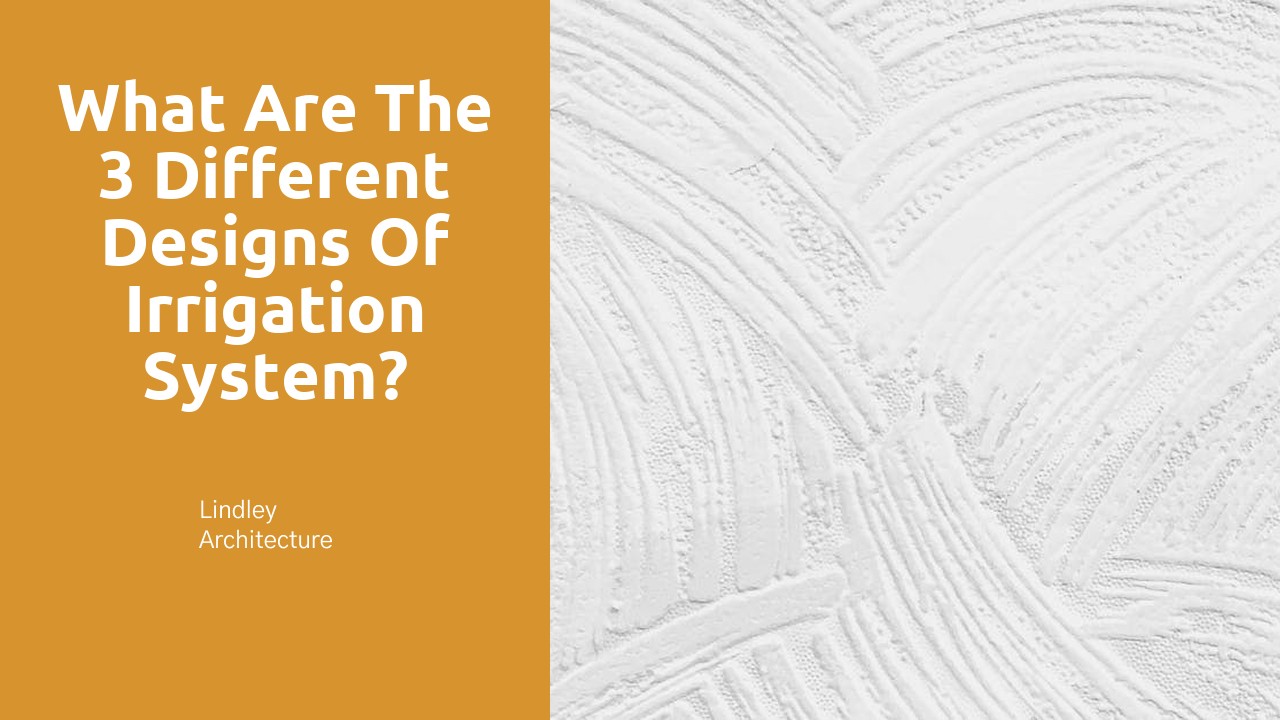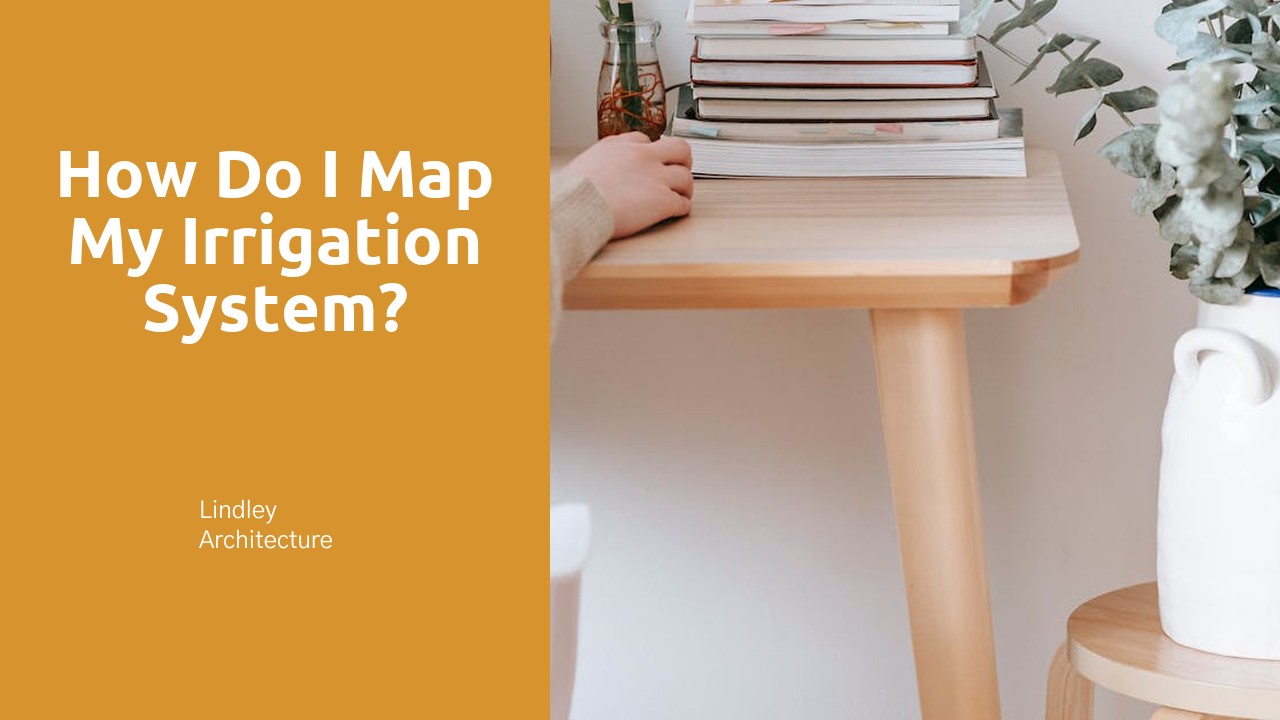
Irrigation Design
Table Of Contents
Lindley Architecture provides top-notch Irrigation Design services, catering to clients looking to enhance the functionality and efficiency of their outdoor spaces. Our team of experienced professionals collaborates closely with clients to create customized irrigation systems that meet their specific needs and budget. We prioritize water conservation and environmental sustainability in our designs, helping clients reduce their water consumption while maintaining healthy and beautiful landscapes. At Lindley Architecture, we strive to deliver innovative and reliable solutions that exceed client expectations and enhance the overall aesthetics and functionality of their properties.
Technology Advancements in Irrigation
Advancements in technology have revolutionized the field of irrigation, making it more efficient and precise. The integration of smart sensors, weather forecasting tools, and remote monitoring systems has enabled farmers to optimize water usage and minimize wastage. Through the use of cutting-edge software, irrigation systems can now be fine-tuned to deliver the right amount of water to crops based on real-time data, thus maximizing yields while conserving resources.
Furthermore, the advent of drone technology has brought about a new era in irrigation management. Drones equipped with high-resolution cameras and infrared sensors can provide detailed insight into crop health and soil moisture levels, allowing for targeted irrigation strategies. By harnessing these technological advancements, farmers can make informed decisions that not only enhance productivity but also contribute to sustainable practices in agriculture.
Automated Irrigation Solutions
Automated irrigation solutions have revolutionized the way we approach watering systems, offering efficiency and convenience for homeowners and agricultural professionals alike. Through the use of sensors and smart technology, these systems can detect soil moisture levels, weather conditions, and plant requirements to deliver precise amounts of water when and where it is needed most. This not only ensures optimal growth and health for plants but also conserves water resources by avoiding overwatering and reducing wastage.
By incorporating automated irrigation solutions, individuals can save time and effort by eliminating the need for manual watering schedules. These systems can be programmed to operate at specific times and durations, taking into account factors such as sunlight intensity and temperature variations. Additionally, remote access capabilities allow users to monitor and adjust settings from their smartphones or computers, providing a level of control and flexibility that was previously unimaginable.
Maintenance Guidelines for Irrigation Systems
Regular maintenance of irrigation systems is essential to ensure optimal performance and longevity. One key aspect of maintenance is checking for any leaks in the system. Even small leaks can lead to significant water wastage over time. Inspecting the pipes, valves, and connections for any signs of leakage should be a routine part of irrigation system maintenance. Additionally, it is important to check for clogs in the system, as these can impede the flow of water and reduce the efficiency of the irrigation system.
Another vital maintenance task is to calibrate the system regularly to ensure that it is delivering the correct amount of water to the plants. Factors such as changes in weather and plant growth can affect the water requirements of the landscape, so it is important to adjust the settings accordingly. Furthermore, cleaning and maintaining the filters in the irrigation system is crucial to prevent blockages and ensure that the water being delivered is free from debris. By staying proactive with maintenance tasks, irrigation systems can operate efficiently and effectively, ultimately contributing to healthier landscapes and conservation of water resources.
Seasonal Inspection Tips
Regular seasonal inspection is crucial for maintaining the efficiency and longevity of your irrigation system. During the spring season, it is recommended to check for any damages or leaks in the system. Ensure that all sprinkler heads are intact and functioning correctly. Cleaning or replacing clogged nozzles can enhance water distribution and prevent water wastage in the long run.
In the summer months, pay attention to the water pressure and coverage of your irrigation system. Adjust the settings to accommodate the warmer weather and prevent under or overwatering. Inspect the soil moisture levels and consider any necessary adjustments to prevent water runoff. Additionally, clear any debris or obstructions around sprinkler heads to ensure optimal performance.
Sustainable Practices in Irrigation
Using sustainable practices in irrigation is crucial for both environmental conservation and efficient water management. By implementing eco-friendly irrigation methods, such as drip irrigation, rainwater harvesting, and soil moisture sensors, water usage can be optimized while minimizing wastage. These strategies not only help in preserving water resources but also contribute to the overall health of the soil and plants, leading to better crop yields and healthier ecosystems.
In addition to eco-friendly irrigation methods, incorporating smart irrigation controllers can further enhance the sustainability of agricultural practices. These controllers utilize data and technology to adjust watering schedules based on real-time weather conditions and plant needs, ensuring that water is used efficiently and effectively. By embracing these sustainable practices, farmers and gardeners can play a significant role in promoting responsible water usage and environmental stewardship.
EcoFriendly Irrigation Methods
Eco-friendly irrigation methods are gaining popularity among farmers and landscapers due to their sustainable and environmentally conscious nature. The use of drip irrigation systems, for example, is a key practice in eco-friendly irrigation. This method delivers water directly to the plant roots, minimizing water wastage through evaporation or runoff. Additionally, rainwater harvesting and greywater recycling are becoming common practices in eco-friendly irrigation, reducing the reliance on freshwater sources and lowering water bills.
Another eco-friendly approach is the utilization of mulch in irrigation systems. Mulch helps retain soil moisture, reduces weed growth, and improves soil health. Furthermore, incorporating native plants in landscaping and farming projects is an eco-friendly choice as these plants are adapted to the local environment, requiring less water and maintenance. By implementing these eco-friendly irrigation methods, individuals can contribute to conserving water resources and promoting a sustainable future for agriculture and landscaping practices.
FAQS
What are some of the latest technology advancements in irrigation systems?
Some of the latest technology advancements in irrigation systems include smart controllers, soil moisture sensors, and weather-based irrigation scheduling tools.
How can automated irrigation solutions benefit homeowners or businesses?
Automated irrigation solutions can benefit homeowners or businesses by optimizing water usage, reducing labor costs, and ensuring that plants receive the right amount of water at the right time.
What are some maintenance guidelines for irrigation systems to ensure their longevity?
To ensure the longevity of irrigation systems, regular maintenance tasks such as checking for leaks, cleaning filters, adjusting sprinkler heads, and monitoring water pressure should be performed.
What are some seasonal inspection tips for maintaining an efficient irrigation system?
Seasonal inspection tips for maintaining an efficient irrigation system include checking for clogged nozzles, adjusting sprinkler heads for proper coverage, and ensuring that all components are functioning correctly before the start of each season.
What are some eco-friendly irrigation methods that can be implemented to promote sustainability?
Eco-friendly irrigation methods such as drip irrigation, rainwater harvesting, and using recycled water can be implemented to promote sustainability and reduce water waste in landscaping practices.






